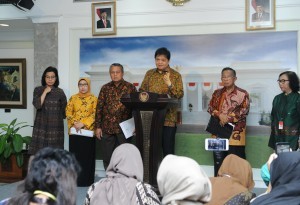Tax Holiday Expanded to Processing Industry, Digital Economy, Industry Minister Says

Minister of Industry delivers a press statement when announcing the16th Economic Policy Package ,at the Presidential Office, Jakarta, Friday (16/11). (Photo by: Jay/ PR Division)
Minister of Industry Airlangga Hartarto asserted that tax holiday in the 16th economic package expands two more sectors: the processing industry based on agriculture, plantations, or forestry and the digital economy.
Meanwhile, there are also categories that are merged into certain sectors in Finance Ministerial Regulation (PMK) Number 35 of 2018, namely computer and smartphone sectors that are merged into electronics or telematics category. Thus, tax holiday has been expanded to cover 18 sectors from the previous 17 sectors, Airlangga said in a statement when announcing the16th Economic Policy Package, at the Presidential Office, Jakarta, Friday (16/11).
The expansion also covers an increase in the number of Indonesian Standard of Industrial Classification (KBLI) and an update of several pioneer industries. There are 70 additional KBLI so there are 169 KLBI eligible to get tax holiday.
Not to mention 99 KBLI are being simplified which are also a merger of several KBLI. Coordinating Minister for the Economy said that the system can be accessed through Online Single Submission or OSS, Airlangga added.
The second point regulated in the policy package is regarding the negative investment list (DNI). According to Airlangga, the new economic package allows several industry sectors in which the partnership and investment were considered not meet the expectation to fully open to foreign capital.
The sectors that are open to foreign capital are, among others, fabric and woven printing, copra, soy sauce, milk processing, condensed milk, wood industrial goods, essential oils, nails, nuts, and bolts, the Minister said.
Previously, several business areas including crane rubber was fully open for foreign investment with certain requirements namely obligation to own plantation, but now the industry is open for foreign investment with cooperation only.
As for Small and Medium Enterprises (SMEs), it do not require partnership anymore to establish an industry. We also abolish the requirement that new industry must have affiliation with existing industry particularly in clove cigarettes, white cigarettes products, Airlangga explained.
Therefore, in establishing an industry, there is no obligation to cooperate with other companies in the same field. The Government also provides alkaline treatment to SMEs in seaweed industry, and semi refine carrageenan to Micro, Small, and Medium Enterprises (MSMEs). Meanwhile, the downstream process can be handled by investors.
The scheme of MSMEs and partnership can also be in the form of contracts, raw material supply or plasma core activities, or other form of partnership.
On the same occasion, Minister of Finance Sri Mulyani explained that the current fiscal instrument which is aimed at encouraging industrialization is included in a framework to develop a more comprehensive industry in Indonesia from downstream to upstream.
For that reason, tax holiday as a fiscal instrument is expanded and the Government will implement the policy to the revised KBLI. And, we will issue the revised Finance Ministerial Regulation soon, Sri Mulyani added.
Regarding export earnings for tax holiday, the Minister said that simplification through Online Single Submission (OSS) has brought Rp100 trillion worth of new investment in the tax holiday scheme to Indonesia within six months.
By expanding KBLI sector, the number of investment is expected to increase. We will monitor the progress and learn the difference between the old and new tax holiday through OSS. The evaluation will be conducted after we receive the investment. We hope it can encourage and pressure business sector to invest to Indonesia, she said.
The Minister went on to say that her office and Bank Indonesia will cooperate to put export earnings in Indonesian Financial System (SKI) in which Directorate General of Customs and Excise, Bank Indonesia, and the Directorate General of Taxes work together on the enforcement.
Because the Government will give final income tax for earnings deposited both in Rupiah or foreign currency, Directorate General of Taxes will cooperate with Bank Indonesia and Directorate General of Customs and Excise in the enforcement effort, the Minister said adding that because policy of depositing export earnings in designated account is mandatory, there will be administrational sanctions for those who do not do so, one of which would be in the form of export restrictions.
Concerning that matter, Sri Mulyani asserted that Directorate General of Customs and Excise and Directorate General of Taxes have been implementing export policy so exporters can repatriate the funds in Indonesia.
We are ready to implement all provisions of laws and regulations and this policies including policies that require further discussion with Minister of Industry such as policy on tax deduction for vocational and research purposes and also on electric vehicle, Sri Mulyani concluded. (MAY/FID/EN)
Translated by : Rany Anjany Subachrum
Edited by : Yuyu Mulyani








